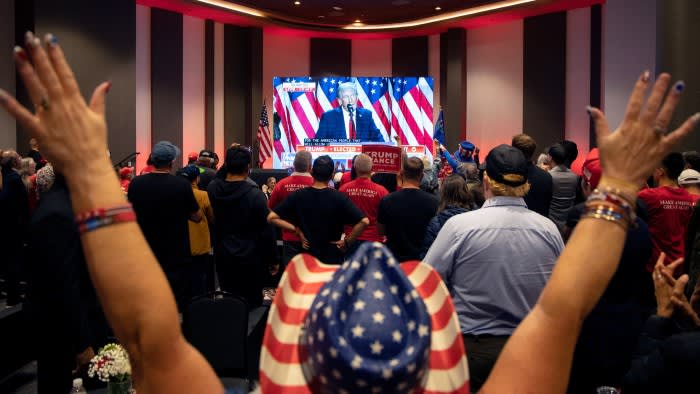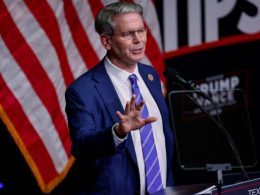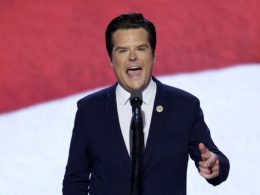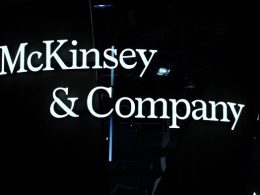This is an on-site version of the White House Watch newsletter. You can read the previous edition here. Sign up for free here to get it on Tuesdays and Thursdays. Email us at whitehousewatch@ft.com
Good morning and welcome to White House Watch. Let’s talk about the split screen in America and Wall Street’s giddiness over coming deregulation.
America’s deep fissures were palpable yesterday as the nation processed the election results.
Reporting from Arizona and Nevada, the two states yet to call the presidential race, the FT’s Myles McCormick and Chris Grimes found both ecstasy and desolation. As Republicans teemed with excitement over Donald Trump’s win, Democrats appeared completely gutted.
Trump’s supporters were fired up about the president-elect’s agenda, and eager for him to enact his policies ASAP. With Republicans set to take control of the Senate — and a solid chance they’ll keep the House of Representatives — the party will have significant legislative power.
Bruce Parks, chair of the Washoe county Republicans in Nevada, told Myles that he looked forward to Trump making good on his promises to increase oil production, shut the border, deport undocumented workers.
Meanwhile, Democrats were conducting a postmortem [free to read].
Matt Bennett, co-founder of centrist Democratic think-tank Third Way, told the FT’s Lauren Fedor:
The Democratic brand is pretty bad. The country has shifted pretty far to the right, and we were not aware of how deep the problem ran.
The voters that we lost . . . looked at Democrats and said: they don’t understand my life. I don’t want them representing me.
Now they need to figure out how to get it together in the years to come. Democrats must craft an agenda that proves the party understands voters’ biggest concerns, said Obama White House alumnus Ken Baer: “We need a generational change. We have had a gerontocracy of 80-year-olds running the Democratic party since Obama left. We need new blood and new leaders.”
When it came down to it, Democrats lost on the economy.
Charles Franklin, a non-partisan pollster and director of the Marquette Law School Poll, told me that the “most pervasive” issue in Wisconsin and nationwide was the cost of living:
People saw their financial situation now is considerably worse than it was four years ago.
You can argue about the macro economic indicators, but you can’t argue with people’s subjective feelings of how they’re doing, and that’s clearly worse.
Transitional times: the latest headlines
What we’re hearing
With Trump’s White House return in sight, US bankers, private equity titans and other financial services executives are drooling over the prospect of deregulation and the chance to boot Biden’s aggressive watchdogs.
While Trump hasn’t said yet who will take the top financial roles in his administration, financial services companies are anticipating industry-friendly picks.
Republicans are expected to usher a more permissive approach to everything from bank capital requirements to takeovers and consumer protection rules in the financial services sector. They’re also likely to allow a new wave of financial products.
After leading the regulatory charge, Securities and Exchange Commission chair Gary Gensler has become the bane of the industry’s existence. With a new leader atop the SEC, money managers think Republicans will change rules that Gensler and other regulators have pushed through, and drop other contentious proposals.
Jack Inglis, chief executive of the Alternative Investment Management Association, told my colleagues: “We anticipate that the administration’s approach to financial regulation will be much more restrained and targeted . . . particularly when it comes to the SEC agenda.”
Many are also hoping Trump’s picks will adopt a more relaxed attitude to M&A than current antitrust officials Lina Khan and Jonathan Kanter. This could spur a dealmaking spree, and in turn boost investment bank earnings and invigorate private equity firms.
But it’s not an entirely rosy picture. Vice president-elect JD Vance has praised some parts of Khan’s agenda. Trump was also all over the place on antitrust, blocking AT&T’s acquisition of Time Warner because of his hatred for CNN, and he’s recently pledged to prevent Nippon Steel’s acquisition of US Steel.
Viewpoints
-
Under Trump, investors will thrive on unstifled market forces, volatility and low taxes. But they risk ending up weaker later, warns John Foley in his latest Lex column. [Available for Premium subscribers]
-
America’s Democrats are part of a global trend as they join a graveyard of incumbents this year, John Burn-Murdoch points out.
-
Anger has become the defining feature of western politics, writes Robert Shrimsley. Quelling it must be a democratic imperative.
-
Trump’s victory poses huge risks — and, possibly, a calamity — for the global economy and the post-1945 world order, writes the FT editorial board.
-
Democrats threw away a winnable election, writes Janan Ganesh. The reason why stems back to a decision made on August 12 2020.
-
FT readers reflect on the election result, sharing how they feel about Trump’s victory and how they view the outlook for the US.
Source link









